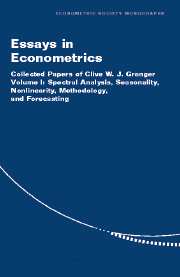1 - The ET Interview: Professor Clive Granger
Published online by Cambridge University Press: 06 July 2010
Summary
Since the 1960's, Clive Granger has been one of our most influential scholars in time series econometrics. His writings encompass all of the major developments over the last 30 years, and he is personally responsible for some of the most exciting ideas and methods of analysis that have occurred during this time. It is now virtually impossible to do empirical work in time series econometrics without using some of his methods or being influenced by his ideas. In the last decade, the explosion of interest in cointegration is alone a striking testimony to the effect that his ideas have had on our discipline. For several decades, his work on causality, spurious regression, and spectral analysis have had profound and lasting influence. Most scholars would deem it the accomplishment of a lifetime if their work were to have the impact of a single one of these contributions. To have had repeated instances of such extraordinarily influential research is surely testimony to Clive Granger's special talent as a researcher and writer.
Possibly the most defining characteristic of Granger's work is his concern for the empirical relevance of his ideas. In a typical Granger paper, this message comes through in a powerful way, and it serves as a useful reminder to us all that ideas truly do come first in research and that mathematical niceties can indeed come later in the successful development of interesting new econometric methods.
Information
- Type
- Chapter
- Information
- Essays in EconometricsCollected Papers of Clive W. J. Granger, pp. 28 - 82Publisher: Cambridge University PressPrint publication year: 2001
Accessibility standard: Unknown
Why this information is here
This section outlines the accessibility features of this content - including support for screen readers, full keyboard navigation and high-contrast display options. This may not be relevant for you.Accessibility Information
- 2
- Cited by
